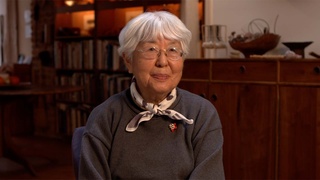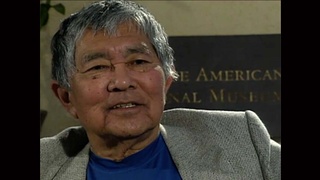Interviews
Political motivation to keep the camps open until end of 1944 election
I knew that there was a very strong political reason for keeping the camps open beyond November of ‘44, which was the presidential election. I put my head together with Donna Komure, who was the young lawyer on the Commission [staff] and we both decided to hand over to Mr. Brooke a few of the documents that specifically said, “Don’t close the camps until after the election is over,” meaning we might lose votes on the West Coast if we do that [close the camps]; that the anti-Japanese group will be so angry at us. And we were able to give to Mr. Brooke two or three documents from different high-level people—the attorney general, the Chief of Staff [General] George C. Marshall, and McCloy himself—that [these papers] confirmed that there was this other reason for not closing the camps; and it was totally political [advantage].
They wanted to wait [to announce camp closings] until Mr. Roosevelt was re-elected. Then, of course, in December [1944], they announced the closing of the camps [after the president was successfully re-elected to his fourth term and after the Supreme Court ruled in favor of Endo]. Mr. Brooke was very happy to have actual proof, directly from the Archives, to show that there was this political motivation to keep the camps open until such time [after the presidential election].
Date: August 26, 1998
Location: Virginia, US
Interviewer: Darcie Iki, Mitchell Maki
Contributed by: Watase Media Arts Center, Japanese American National Museum
Explore More Videos


Her brother’s reasons as a No-No Boy
(b. 1923) Japanese American poet, activist

Her grandfather was pressured to teach Japanese
Sansei judge on the Superior Court of Los Angeles County in California

Neighbor took care of her mother after grandfather was taken by FBI
Sansei judge on the Superior Court of Los Angeles County in California

Becoming first AA State Bar President in California
Sansei judge on the Superior Court of Los Angeles County in California

Immediately after the bombing
(b. 1938) Japanese American. Hiroshima atomic bomb survivor

Other family members not as lucky
(b. 1938) Japanese American. Hiroshima atomic bomb survivor

His parents had little hope that he had survived the atomic bomb
(b. 1938) Japanese American. Hiroshima atomic bomb survivor

His views on nuclear weapons
(b. 1938) Japanese American. Hiroshima atomic bomb survivor

Loss When Leaving for Manzanar
Japanese American animator for Walt Disney and Hanna Barbera (1925-2007)

Forcibly deported to the U.S. from Peru
(b. 1936) Japanese Peruvian incarcerated in Crystal City

Stories of Grandfather at a concentration camp in Fusagasuga
(b.1974) Japanese Colombian who currently resides in the United States

Her grandfather in a concentration camp in Fusagasuga (Spanish)
(b.1974) Japanese Colombian who currently resides in the United States

Family welcomed at Crystal City
(b. 1936) Japanese Peruvian incarcerated in Crystal City

First meal at Crystal City
(b. 1936) Japanese Peruvian incarcerated in Crystal City
